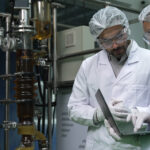Year after year, titanic breakthroughs in technology have transformed the cannabis industry. Technological advancements have impacted all parts of the supply chain, from automated equipment for manufacturers to artificial intelligence that helps growers identify when it’s time to harvest.
Yet, when it comes time to clean those stubborn residues and resins from equipment, floors, grow rooms, bins, and tools, most in the industry resort to the same legacy technology used for decades: isopropyl alcohol (IPA). After all, “if it ain’t broke, don’t fix it.”
But what if it is broken?
IPA has a dark side, but since it has served the industry well as an effective cleaner for the past couple decades, the substance naturally has become the de facto cleaner. Because of this, many operations either have forgotten or never understood the associated risks that need to be taken into consideration when using it. After all, employees, products, and equipment like trimming machines will be exposed to the solvent in some capacity.
There are three important safety risks everyone should know before employing isopropyl alcohol in their facility.
IPA is highly flammable
A “flash point” is defined as the lowest temperature at which a liquid will ignite. Isopropyl alcohol’s flash point of 54°F (12°C) makes it combustible at well below room temperature.
When using IPA in a limited capacity—as it’s intended to be used—the risk of the liquid or fumes being exposed to an ignition source is relatively low. However, many in the cannabis industry have seen gallons of IPA dumped onto a floor as part of the cleaning process. This is a recipe for disaster.
Because IPA is flammable, it’s important to adhere to standards set by the Occupational Safety and Health Administration. Store the liquid in a cabinet designed specifically for combustibles, ensure proper ventilation, and make sure to check your local area’s regulations, which might require other special storage measures.
IPA vapors can be hazardous to health
Since most cleaning in this industry is done manually, it’s important to know the risks associated with overexposure to cleaning chemicals. Inhaling IPA vapors can irritate eyes, throats, and noses. Repeated or prolonged exposure to high levels of IPA vapors can lead to headaches, dizziness, drowsiness, and loss of coordination.
For these reasons, it’s important to follow the proper personal protective equipment measures provided by the Safety Data Sheet to minimize exposure hazards. Most often, this includes gloves, protective clothing, safety glasses and, in many cases, respirators.
Isopropyl alcohol is not compatible with many facility parts
It’s important to note the solvent has varying effects on different surface types, as solvents may soften or dissolve non-stainless-steel parts like pipes, gaskets, and O-rings. These parts can be costly to replace, cause unplanned downtime for equipment, and even lead to safety concerns when equipment malfunctions.
Between the hazardous fumes and the constant need to reclean, many companies are beginning to question whether there’s a better way to clean inside their facilities. With more states legalizing cannabis and federal legalization hopefully on the horizon, businesses that traditionally serviced the pharmaceutical industry have turned their eyes toward the cannabis industry. Due to the pharmaceutical industry’s strict regulations, these businesses developed a specialty in cleaning the most difficult soils and residues without the use of solvents.
One such solution is fairly new: an aqueous-based cleaner specifically designed to target the oils, resins, and residues that are well known in the industry. The raw materials used in the cleaner break down resins, trap insoluble particles, and keep them suspended in the solution rather than spreading them further around the facility and its equipment.
Utilizing an aqueous-based cleaner means the detergents aren’t flammable and have a lower risk of inhalation exposure.
How difficult is it to switch cleaners? Since most regions don’t regulate what cannabis companies can use, switching cleaners is not time-intensive like it would be for a pharmaceutical company.
What about financial costs?
One reason solvents like IPA are so popular is because they are relatively inexpensive. Because of this, a common misconception is that switching to an aqueous-based cleaner will hurt a company’s bottom line. In reality, this may not be the case when you take into consideration other factors that ultimately affect the profit-and-loss statement. With IPA cleaners, companies often find themselves repeating their entire cleaning process multiple times in order to achieve a passing result. Using chemistry specifically designed to target cannabis resins may drastically reduce cleaning time, limit equipment downtime, and allow production of more of the high-value products on which businesses rely.
In a heavily regulated industry, nothing can be taken for granted. Although today’s cleaning regulations are modest compared to those in the food and pharmaceutical industries, stricter rules will come with federal legalization. Customers deserve safe products, and employees deserve safe spaces in which to work. It’s worth considering alternatives to IPA and adapting your processes now rather than waiting for the mandates.













[…] interactive product displays also are designed to be more hygienic than the old-school candy-jar model. “People are more health-conscious and germ-aware these […]
[…] testing requirements and give cultivators complete confidence they are distributing only safe, clean products into the legal […]